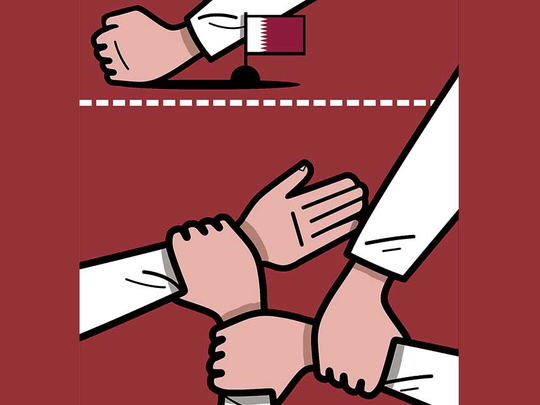
The Gulf Cooperation Council (GCC)-Qatar row has reached a critical mass. Within the grouping there is a consensus that Doha must come clean. It must display greater seriousness regarding its latest agreement of stopping financing of terror activities. This must not be solely because of American pressure. The anti-terror alliance of Saudi Arabia, the UAE, Bahrain and Egypt are clear: While United States Secretary of State Rex Tillerson’s recent efforts to mend relations with the Gulf state are appreciable, the region cannot be held hostage to Qatari intransigence.
As a matter of fact, the latest agreement of Qatar (with the US) doesn’t seem to go far enough, although it does address some of the 13 points put forth by the four-country coalition. In all fairness, none of the conditions are new. They were agreed upon in a private meeting by the same countries who cut off ties with Qatar for similar reasons (for nine months) back in 2014. Then the Qatari leadership had agreed to stop supporting and funding terror outfits.
In the current scenario, Qatar must stop pussy-footing. Instead, it must put its money where its mouth is. The country must honour the spirit of the Riyadh Agreement (copies of which were leaked recently by CNN) that testify to Doha’s commitment to stop financing groups like the Muslim Brotherhood. One of the reasons why the Egyptian government continues to be irked by Doha’s behaviour is that Qatar has repeatedly failed to live up to its past pledges.
Last week, the Gulf witnessed much diplomatic hype and activity with the visit of Tillerson, who started off his trip from Kuwait (the state involved in mediation efforts), but moved around the region, visiting Qatar and Saudi Arabia in an attempt to end the dispute. He is seeking to act as a bridge-builder and lend a hand to the mediation process. America’s shuttle diplomacy of bringing a diverse set of views together is being monitored closely in the region.
Analysts note that the decline in the relations between Qatar and the other Arab nations (Saudi Arabia, the UAE, Bahrain and Egypt) can be stemmed and turned around through a renewed commitment from Qatar, that it would replenish previously signed agreements, including reducing relations with Iran. Doha will have to go a step forward and do away with the recently set-up Turkish base on its soil that has proved to be a new source of irritation to its Gulf neighbours.
All is not lost despite the seemingly intractable positions. The Gulf partners plus Egypt strongly believe in the need to create a regional system that would protect their safety, security and strategic environment. This can only be achieved by following a united and aligned stance.
The longer the Qatar-GCC dispute lasts, the trickier it will get, putting the world economy in peril. The Gulf region has already seen a myriad of international diplomats in and out of the region, including officials from Britain, Germany and US. Besides other things, this demonstrates the importance of the region, which controls a fifth of the global energy supplies, one-third of global crude reserves and one-third of the world’s natural gas deposits, making it a crucial arc of stability. As part of the Gulf region, Qatar must behave like a responsible nation with no skeletons-in-the-cupboard. It must also convey a clear message to both its neighbouring Arab states and the visiting dignitaries. This is also what the four countries expect of Doha: No ghouls, shadows and spectres in the background.
Diplomacy has an important role to play in ending the impasse. Tillerson’s recent visit comes in the wake of the visit of British Foreign Secretary Boris Johnson to the Gulf, praising Kuwait’s mediation efforts to end the rift between the GCC states while expressing cautious optimism that progress can be made. But nobody is yet willing to make a bid on just when the rift will end — it could be weeks or even months.
Despite the seemingly hardened attitudes, Qatar’s latest agreement with the US to combat terrorism and terror financing is viewed with some degree of caution. The anti-terror partners still want more assurances. Responding to the US-Qatari agreement by releasing a joint statement, the anti-terror quartet noted: “Such a step is not sufficient and we will closely monitor the seriousness of Qatar in combating all forms of funding, supporting and fostering terrorism.”
While the basis for an agreement has already been constructed, the onus is now on Doha to start and initiate confidence-building measures because Qatar has a track record of reneging on past pledges, failing to crackdown on terror groups and turning off its financial tap for the extremist voices. Its promise to stop interfering in the affairs of other states as well as muffling Al Jazeera news channel will be closely watched in the Gulf capitals. It is the legitimate fears and concerns of the four states that must now be allayed so that the ship can stay on course and for the GCC bloc to become united once again.
Marwan Asmar is a commentator based in Amman. He has long worked in journalism and has a PhD in Political Science from Leeds University in the UK.












